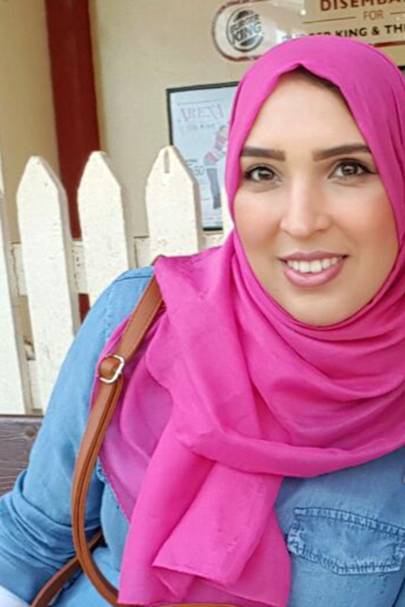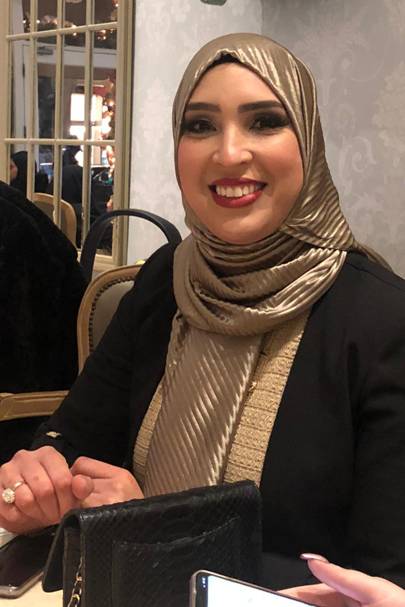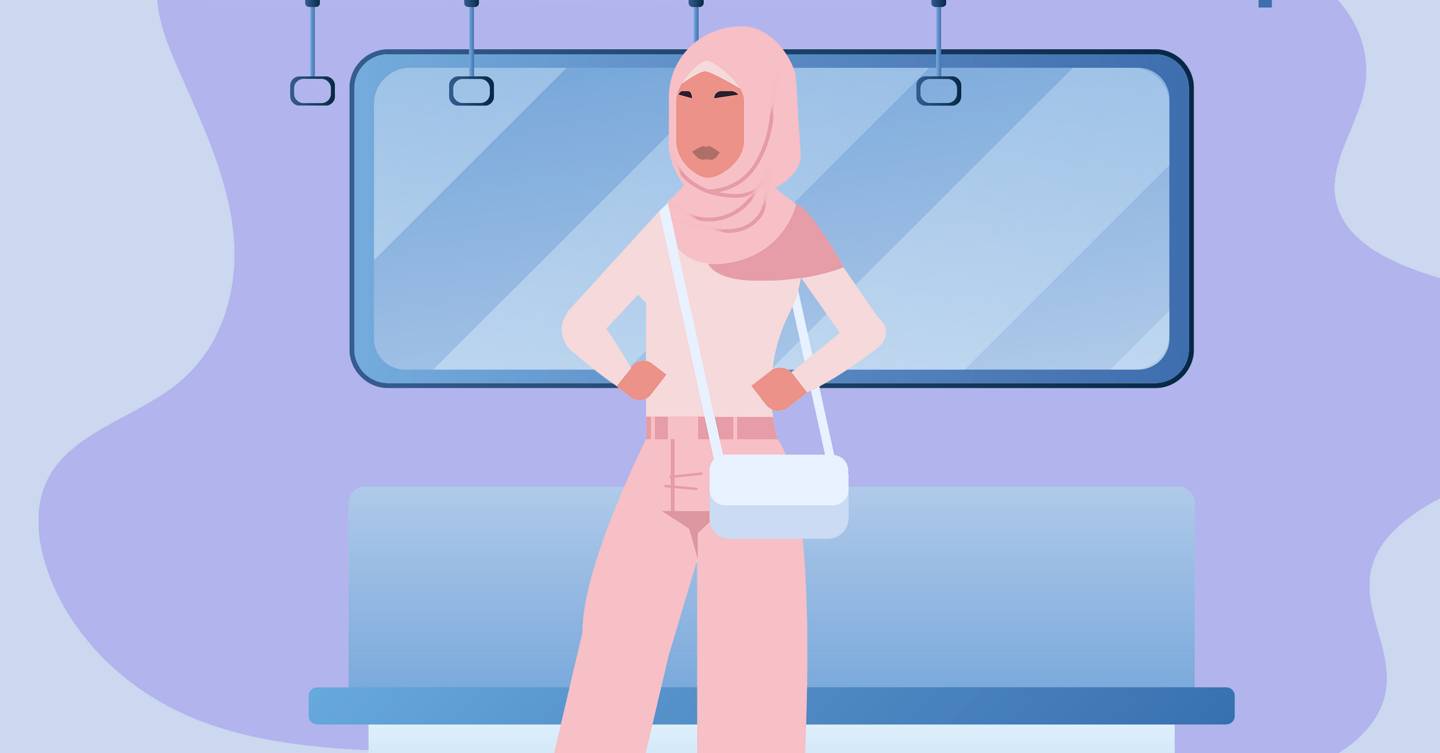What would you do if you saw a young family being racially abused on public transport? Would you put your headphones on and turn up the music? Would you think about doing something, but be too scared in case the abuser turned on you? Or would you stand up in the face of hate, in spite of that risk to yourself, and defend those being attacked?
For 36-year-old, London-born, mother of two, Asma Shuweikh, the decision could not have been clearer. Last week, when she found herself in the same London tube carriage as a Jewish couple with three young children, who were being bombarded with vile anti-Semitic rhetoric, she stepped in and confronted the ‘attacker’ – and has been hailed a hero ever since.
Subsequently, the video of part of the showdown, recorded by a fellow commuter and film-maker Chris Atkins, went viral. What makes Asma’s story more special and important for many, wasn’t just that she put herself in the way of danger for others, but the fact she herself, is a Muslim woman, who wears a Hijab.
“For me, it had nothing to do with religion,” she tells me over the phone this morning. “As a mother, as an upright citizen, there was no way I was going to sit back and allow that man to abuse those children like that. It was just awful.”

Asma had been visiting a friend in London and had got on the tube at Golders Green Tube Station to head back to Birmingham, where she lives. The carriage was filling up quickly, when a man pushed past her and headed straight for a Jewish family wearing skull caps. “He said, ‘Are you a Jew?’ The dad said, ‘Yeah’. He started shouting, ‘Jews are imposters. You’re not a real Jew!’”, Asma recalls. “I stood there thinking, ‘Is this really happening? What the hell is he going on about? And what gives this man the right to speak to somebody like that? I don’t mind debating about religion. It’s fine if you don’t agree with somebody – but you have to have respect for other people’s beliefs.”
As the attacker contineed his abuse, a fellow passenger, a male, stepped in and tried to stop the abuse, but the man physically threatened to punch him.
The attacker, says Asma, had come onto the tube prepared to be abusive. “He had a bible and sticky notes and was reading anti-Semitic passages from it.” But as soon as he started abusing the young boy, Asma felt she could no longer be a bystander.
“He said to him, ‘Do you know, you’re going to be my slave?’ He was swearing a lot. I thought, ‘If I was with my children and this happened to me, I would be so defensive…I would hope someone would stand up for me.’ I just stepped in and tried to placate him by saying, ‘These are children. You are on a tube. Please calm down.’ I tried to educate him, in a way. To say to him, ‘What you’re doing is wrong. If you want to talk there are ways of talking in a respectful manner, but not like this.’
“People have since said to me, I was brave, but I didn’t really think about what I was doing…There’s a lot of negative media against Islam, but actually, we’re encouraged to be brave, to stand up verbally and physically if you see injustice. So my spirituality is what gave me my strength.”
The attacker quickly turned his attention on to Asma, abusing her for wearing trousers and telling her she didn’t care about her own religion. “I did become a bit scared at this point, because he was right in my face” she admits. “I kept saying, ‘Back off. Move away from me.’”
Did anyone jump to her defence? “No,” she says. “And thank goodness – it could have turned violent. The Jewish family and I both got off at Leicester Square but we were all in shock, we didn’t speak – we just went our separate ways.”
Sadly, this was not the first time Asma has been a victim of racist abuse.
“My family are originally from Libya, but I was born in Barnet, North London. I am English and this is my country. I am assimilated. But I wore the Hijab from age 12 and it was tough at school. Other kids would pull my Hijab off my head and I was constantly in fights. When I complained to teachers, they’d say, ‘Well, you shouldn’t push your religion in their face so much. They were racist too,” she says, adding that she has also been spat in the face for being Muslim.
“I think racism for Muslims and Jews and general intolerance has increased since Brexit. I’ve been told to ‘Go back to my country.’ My answer is always the same, ‘Go back to where? London?’ I’ve only visited Libya a few times in my life; England is my home. I am not political, I don’t want to talk specifics, or discuss who I’ll vote for – I don’t always vote to be honest – but I wanted to talk about what happened on that tube journey to show people that within this turmoil, there is good in the world.”
How have her friends and family – and her wider community – responded to seeing the video? “Well I didn’t know about the video until the next day. I was putting on my makeup and my phone kept buzzing with texts, when it’s normally quiet. My friend called me and said, “Is this you in this video? It looks like you. It sounds like you…’
Asma didn’t realise a fellow passenger had been recording her. “My first response was, ‘Oh god, they’ve actually filmed me. I hate seeing myself on film!”
She quickly joined Twitter to watch the video. “I was completely overwhelmed by what I saw on there. All these people commenting, there was even a hashtag #bemoreasma. I really had to think, ‘What did I do that was so big?’ This is my personality. I have a big mouth. My husband said to me, ‘What have you said now?’ He often tells me I’m going to get in trouble one day because I speak up, but I care deeply about things, that’s just who I am.”
The support didn’t stop there. When she took her daughter to school the next morning, she was greeted by a stampede of congratulations and hugs from the parents and teachers. “They said thank you for showing the world that Muslims don’t all hate Jews; that We’re not intolerant of other cultures; that it’s not all about us. I also had hundreds of messages from Libya and also, the Arab world, in support of my actions, They told me they are proud of me.”

Has there been any backlash? “Yes, there were comments online asking what it had to do with me, and why would I get involved? I also got some negativity from the Arab world, but it was about 10 percent of all comments. And I’m choosing to focus on the positivity. Someone said to me “You’ve done for good relations between Muslim and Jewish communities what people have failed to do for a long time.”
Two days later, she received a phone call from the Jewish man on the tube, who thanked her, and said he’d like to meet up. On Monday, three days after the attack, they met for a coffee, where she was doing an interview for the BBC. “He brought me flowers,” she says, her voice breaking with emotion. “We talked for an hour. We had such a good conversation and found much common ground.”
And, if I’m honest, at this point in our interview I start to cry myself. As a British-born Jewish woman, I’ve never felt so much negativity and anti-Semitism rising to the surface recently, especially in the face of the election.
My fear of a man with Jeremy Corbyn’s views potentially entering no.10 keeps me up at night and makes me wonder what my future is in the UK, should his, what I believe to be deeply worrying attitudes towards anti-Semitism become more commonplace. So to be able to speak to a Muslim woman, to hear her love, her bravery and willingness to bridge the divide between our communities in this way, was too much.
For some background: there is a stereotype that Jews and Muslims do not get on. In reality, their history has shown the two communities living side by side throughout the Middle Ages. The semitic unity between them goes back to the Prophet Muhammed’s (who Asma tells me, ‘had Jewish neighbours and friends”) and at the time Jewish communities were honoured as “people of the book.” In recent years, conflict has arisen due to political fractions in the Middle East. But even so, both communities are united by the fact they are often at the receiving end of the same kind of racist abuse in the diaspora. Jews and Muslims continue to live side by side in many countries in the world.
It’s why I end our conversation by telling her that, like so many of us, I am so proud of her also. We discuss ways we could all bridge the divide between our communities further, to bring women – and men – who face any kind of prejudice, together. “I tell anyone who has prejudice towards other people: don’t just speculate and assume, educate yourself instead. Read their books. Ask yourself: have you met them? Do you know them? How can you judge someone if you don’t even know them?”
So dear reader, I ask you again: If you were faced with this racist tube dilemma, what would you do now?
As for me? My plan now and forever more is to #bemoreasma.
